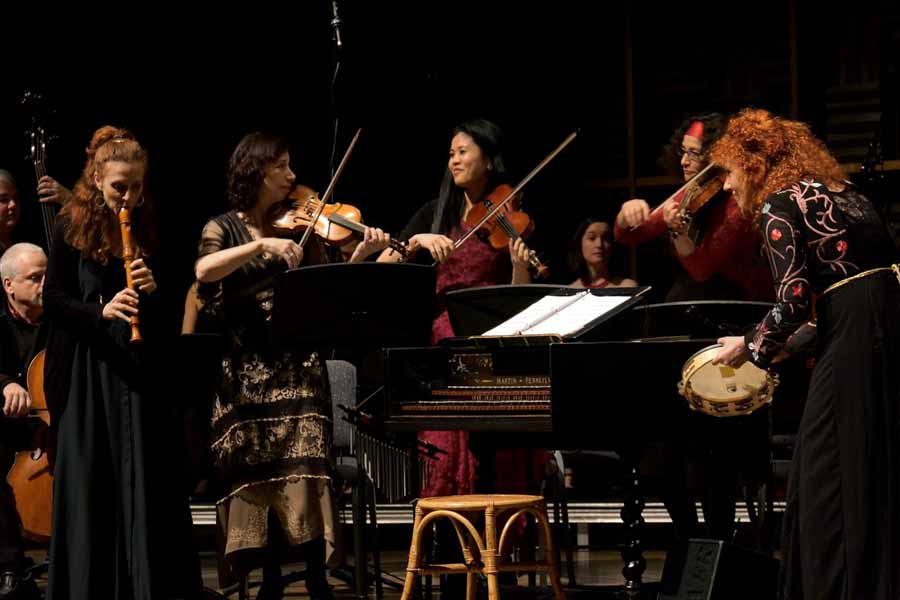by Kevin McLaughlin

The third in a triptych of Jewish-themed programs titled “Exile and Resilience,” this one — thoughtfully conceived and researched program by Sorrell — offered seven perspectives on Jewish and African exile.
Between each set, Sorrell spoke to the audience with heartfelt affection for the music. In addition to the four Northeast Ohio performances, Apollo’s Fire will take their program on the road to Chicago, San Francisco, Palo Alto, New York, London, and Heidelberg.
As a sort of prologue, “Abraham, Abraham” allowed Polina Shepherd, a Yiddish/Russian singer of rare gifts, to set the tone in a Hasidic message of entreaty to the patriarch of Israel (“Abraham, our father, why do you not go?”). Her expressive voice and face seemed to represent every exile’s sense of yearning and hope, the sum of the tales to come.
In the second grouping, “Sojourn in Italy,” a set for the instrumentalists alone, the ensemble performed a trio of works probably heard in Jewish ghettos of Venice and Mantua. Violinists Alan Choo and Emi Tanabe traded fierce licks in Rossi’s Sonata in Dialogo, ably supported by cellist René Schiffer.
Sorrell’s excellent program notes drew connections between the Jewish and African exiles on the program, immigration in our day, the ongoing plight of refugees in Europe and in our own country, and the persistence of antisemitism and racism. The sidebars, titled “Exile & immigrant stories from our musicians,” described family histories, adding a different kind of authenticity to the period ensemble’s performance.
Sorrell arranged or adapted much of the program, including settings of the African American spirituals My Father, How Long?, Nobody Knows the Trouble I’ve Seen, and Oh Freedom, which were particularly effective. The brief four-part setting (temporarily five-part when Sorrell joined in, perhaps in spite of herself), including the words “No more moanin’,” was pure joy. Singing with a clear and resonant voice and a sense of onstage commitment, baritone Charles Wesley Evans gave strong performances here. Ashlee Foreman shone as well, her soprano well-focused and attractive.
The “Shtetl Wedding” set that followed allowed klezmer clarinetist Merlin Shepherd to stand up and get the party going. Backed by the band (the violin duo again lifted spirits) — with slick solos by Daphna Mor on recorder and wizardry by Tina Bergmann on hammered dulcimer — Shepherd displayed traditional adherence even as he let himself revel. His solos were part documents of the past and part bacchanalia.
After a “Muslim Call to Prayer” serving to resume the concert following intermission, tenor Jacob Perry and theorbist William Simms collaborated in a movement from Monteverdi’s Vespers of 1610. One interpretation of the Old Testament regarded the beloved in the Song of Solomon as a Black woman and a prototype of the Virgin Mary. She states, “Nigra sum, sed formosa” (“I am black, but comely”). The Monteverdi setting was a thoughtful inclusion by Sorrell.
Baritone Edward Vogel, who replaced Jeffrey Strauss at the last minute (he received the music two days prior, I’m told), acquitted himself beautifully all evening. Another highlight came from Polina Shepherd, who again touched hearts in the “Wounded World” set with her affecting portrayal of a postwar Jewish refugee arriving in a new town — ending with the harrowing Unzer Shtetl Brent (“Our Town is on Fire”).
The final set, “Neighborhood Gathering,” brought dancing and singing and general merriment. Clarinetist Merlin Shepherd again gave everything in La Komida la Manyana (“The Morning Meal”), a traditional Sephardic/Ladino song. If only the stage had been a little bigger, the celebration may have been more vigorous and gone on a little longer.
Published on ClevelandClassical.com March 14, 2023.
Click here for a printable copy of this article



